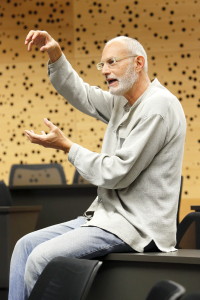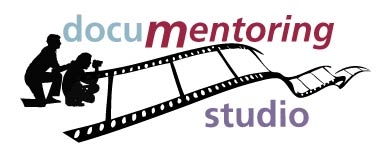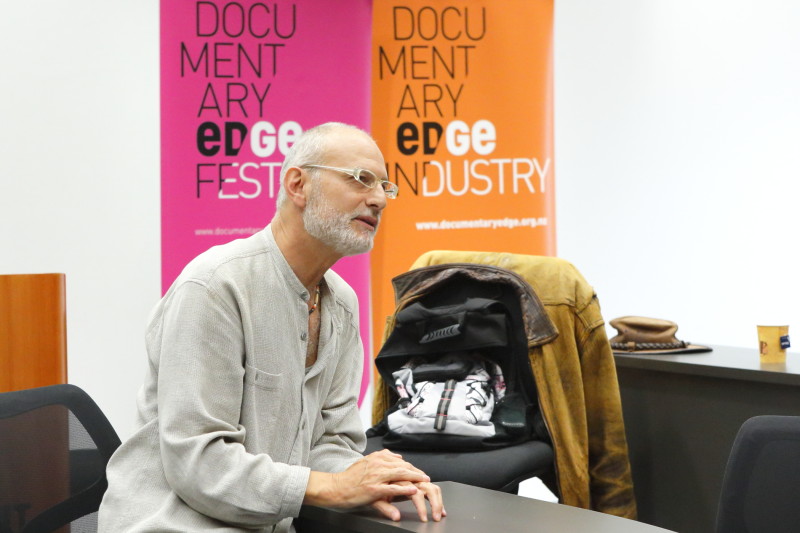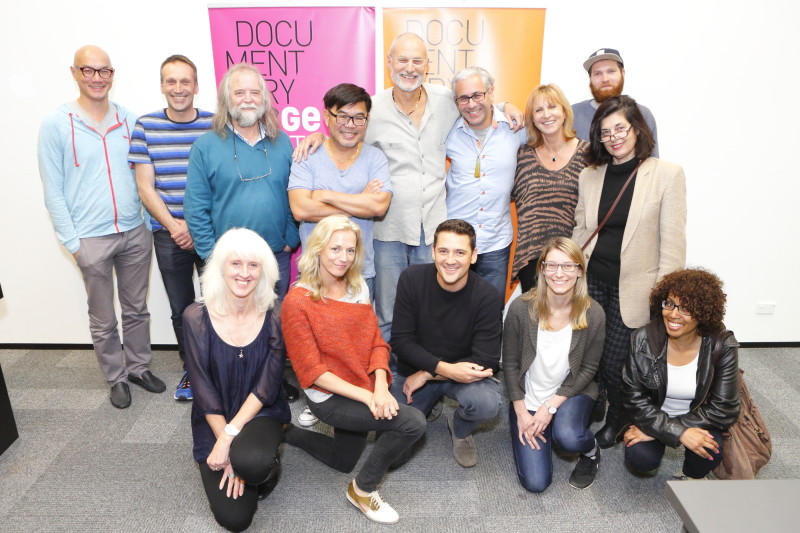DocuMentoring Studio
Learn documentary filmmaking in this innovative film making course for teens and young adults. In this 8-week film internship course, award-winning movie producer Frederick Marx teaches students ages 15-25 how to make a documentary. Our intensive DocuMentoring Studio combines a tested curriculum and demanding expectations with acclaimed professional filmmakers to instruct and mentor a select group of young people in all aspects of documentary film production. The demanding course directs future talents to make films for and about the communities and community service organizations where they live.
In partnership with you we are empowering youth to bear witness and create change.
We partner with education institutions to bring this documentary workshop to students. To date we have partnered with:
- Rutgers University
- New Jersey Institute of Technology
- San Francisco Art Institute
- Bay Area Video Coalition
Help us bring documentary filmmaking to YOUR town. Ask your local education institution(s) to partner with us! Download the brochure below and reach out to us at [email protected] as soon as you can!
Download Our Pamphlet“The way our film producer Frederick orchestrated the class into a network of thoughtful people helping each other make the best decisions possible, to help us create the most moving films in the shortest possible time, was sublime, brilliant, and unique. More than what I learned in the class, it’s an opportunity that has afforded me priceless long-term mentorship – a real chance to grow as a person. I only want other young people, as many as possible, to have this same amazing opportunity.”
– Jeffrey Schneider, Freelance Documentarian, Hollywood, CA
Read a San Francisco Chronicle article about DocuMentoring.
Opportunity
Young people thirst for mentorship. They desperately seek their place in the world, and an understanding of how they can make it meaningful. How we guide our youth to significant contributions is an evolving challenge in a society increasingly immersed in high velocity, low content media. Internet, I-Pod, cable TV and other outlets that broadcast or screen short documentaries are proliferating. MySpace, YouTube, Current, Yahoo, AtomFilms are only some of the biggest names in short video releasing on the web. More and more, the youth of America are picking up movie cameras with the desire to communicate, aspiring to become a filmmaking great. Unlike years past when most wanted to be the next Steven Spielberg, with the public’s recent embrace of documentary films many now want to be the next Michael Moore or Ken Burns.
With the conditions now in place, with the right guidance and tools, there is a profound opportunity to empower youth from diverse socio-economic backgrounds today. Through practical training in socially oriented filmmaking these youth can find both social meaning and individual excellence. Warrior Films, through its cornerstone DocuMentoring Studio, has the expertise, experience and passion to deliver this opportunity.
Workshop
 Through its 8-week fulltime workshop, the DocuMentoring Studio combines a tested curriculum and demanding expectations with acclaimed professional filmmakers to instruct and mentor a select group of young people in all aspects of documentary production. The demanding course directs future talents to make films for and about the communities and community service organizations where they live.
Through its 8-week fulltime workshop, the DocuMentoring Studio combines a tested curriculum and demanding expectations with acclaimed professional filmmakers to instruct and mentor a select group of young people in all aspects of documentary production. The demanding course directs future talents to make films for and about the communities and community service organizations where they live.
The workshop brings together 18-20 participants with the passion and commitment to gain practical experience in telling the story of a social issue relevant to them. All carefully selected participants pair up and complete a 5-10 minute film, which is then shared with their partner organizations, their community, their families and friends in a public celebration in the final week.
The makeup of the participant pool targets 50% low-income individuals, providing them with a small stipend to sustain their commitment. For some students, the workshop also provides academic credit. The students range in age from 15-25, from high school sophomores to college graduate students. As much as possible, the students are paired across race, class, and gender lines to form their filmmaking teams.
The number of end product films made is clear and measurable but the intangible impacts of the workshop go much deeper. The shorts will help the social organizations they document by spreading the word of their work and its benefits to a broadly expanded audience. As for the workshop graduates, while some will go on to develop careers as doc-makers (and be mentored in the process), the Studio will help them all become activated citizens, leaders, and empowered agents of social change.
Leading the workshop is Frederick Marx, an internationally acclaimed, Oscar & Emmy nominated movie producer/director with 30 years in the film business. He was named a Chicago Tribune Artist of the Year for 1994, a 1995 Guggenheim Fellow, and a recipient of a Robert F. Kennedy Special Achievement Award. His film HOOP DREAMS played in hundreds of theatres nationwide after winning the Audience Award at the Sundance Film Festival and was the first documentary ever chosen to close the New York Film Festival. HOOP DREAMS was on over 100 “Ten Best” lists and was named Best Film of the Year by critics Roger Ebert, Gene Siskel, Gene Shalit, Ken Turran and by the Chicago Film Critics Association. It is one of the highest grossing non-musical documentaries in US history. The DocuMentoring Studio is the culmination of Frederick’s life’s work as an artist, teacher, and social activist.
Overcoming Barriers
The 8-week schedule takes participants through a progression of knowledge, techniques, and experiences. Here is how it succeeds in overcoming the traditional barriers to filmmaking by providing the following benefits:
Access:
The workshop provides access to the necessary digital filmmaking tools, enabling all the possibility to pursue the dream.
Inspiration:
The film internship workshop guides students to find stories they themselves care about deeply, to sources in their own passions. By combining instruction on how to find and create stories with journals, self-reflections, and group discussions, inspiration is uncovered and sustained. Young filmmakers are directed back to everyday life, back to their own families, neighborhoods, and communities to find stories, to understand that many of even the best fiction films can and do start with lived realities.
Mentoring:
Most young filmmakers don’t have the mentoring they need to fully realize their visions. Even the best students need some guidance, some mentoring from those with more experience. Students can draw on the lifelong experience of fully seasoned doc-makers, quickly accessing crucial best practices info, rather than re-inventing the wheel themselves, or getting less real world information from professional teachers.
Purpose:
Students are made aware of A GREATER PURPOSE for their work. It’s not enough that they make films they have passion for. What’s also important is that they realize how their work can be, MUST be, put at the service of others. The films can and should be used by non-profit collaborators to serve as PR and fundraising tools. The films can and should be used by some of those same non-profits and other community groups to spread awareness about important local issues. They provide a crucial link in a loop of feedback and dialogue within the community.
Statement of Impact
Students
- Receive stipends to learn
- Build resumes, sharpen career goals
- Improve media literacy
- Grow in self-esteem and confidence
- Enhance multi-cultural learning by partnering across race, class, and gender lines
- Experience creative expression as their natural gift
- Step into community leadership and receive acknowledgement for it
- Sharpen professional skills: meeting deadlines, making appointments, budgeting time, being accountable
Host Institutions
- Receive positive press
- Enhance community relations
- Maximize use of existing facilities and equipment
- Expand their client base
Local Non-profits
- Receive short documentaries to serve as PR and fundraising tools
- Educate youth on their service mission
- Gather important feedback on how they’re doing
Programmers
- Receive low cost content of ideal length: 5-10 minutes
- Receive content from (and for) their ideal youth demographic
- Generate positive press
Communities
- Grow new leader-stakeholders
- Gain important feedback on how they’re doing
- Utilize divergent resources to hold screenings
- Heighten awareness of key local issues
- Unify neighborhoods with communal events
Filmmaker Mentors
- Access new, inexpensive pools of labor
- Utilize free Equipment for own projects
- Get inspiration, ideas, direction from young people
- Receive honoraria
Testimonials
“With Frederick as their mentor, our students blossomed not only as filmmakers but as concerned and active citizens. Frederick helps students to become effective storytellers, and more importantly, inspires them to understand the ethics and power of the mediamaker. Three years after the program, I know that all of the students involved are using their media skills to advance their own vision for social change.”
— Patricia Cogley, Associate Director, Bay Area Video Coalition
“As a filmmaker, as a teacher and as an activist, [Frederick] has steadfastly insisted that the very process of media production is a social process, one that significantly engages people in creative thought and action. He has the essential ability to inspire people to new ways of thinking and doing. He is also a meticulous and demanding artist, one who instills in his students an attention to and love of the medium. It is his unflagging attention to the craft of media work, and at the same time its inescapable social relevance, the work and its meaning, that make him one of the country’s most unusual and important filmmakers.”
— Chris Bratton, President, San Francisco Art Institute
“Filming “Boys to Men” at Rutgers University in Newark, Frederick made extensive use of undergraduate students from Rutgers-Newark and our neighbor, New Jersey Institute of Technology. Those students had an extraordinary experience, and simply could not stop raving about how much they had learned. Frederick is truly a gifted mentor and teacher as well as a talented documentary filmmaker.”
— Stephen J. Diner, Provost, Rutgers University – Newark
“I observed, while watching the films being screened, that the relationships between the young people were life changing. Frederick’s leadership, technical expertise, and personal style enabled the students he worked with to turn their energy into a creative force that produced personal, provocative and inspired works of art. He was a wonderful mentor to those students who left the program feeling capable and competent.
— Kate Eilertson, Executive Director, Museum of Craft and Folk Art
Students:
“The way Frederick orchestrated the class into a network of thoughtful people helping each other make the best decisions possible, to help us create the most moving films in the shortest possible time, was sublime, brilliant, and unique. More than what I learned in the class, it’s an opportunity that has afforded me priceless long-term mentorship – a real chance to grow as a person. I only want other young people, as many as possible, to have this same amazing opportunity.”
— Jeffrey Schneider, Freelance Documentarian, Hollywood, CA
“Frederick has inspired not only myself to action but I have observed this in nearly everyone he comes in contact with. He created an environment that changed both my life and Jose-Luis Mejia’s – my workshop filmmaking partner. Jose-Luis gained confidence and is now actively teaching others and I am no longer a banker – I am making doc films and teaching. His commitment to all of us throughout the course was exemplary. But what is really amazing is his continued dedication to all of us, and to helping further our own projects and goals.”
— Heather Kessinger, Documentary filmmaker, San Francisco, CA
Workshop Resource Requirements
Facility & equipment requirement: The host institution traditionally provides the necessary classroom facilities, editing computers and decks, cameras, sound and all field EQ, support staff (help reviewing applications, facility troubleshooting), etc. They often also provide the first pool of potential candidates.
Financial resource requirement: The whole $17,500 cost of the program can be met through paid tuition: 12 students @ $1,500 each. As a Plan B, it’s also possible to raise all necessary revenues as donations from institutions, companies and/or private philanthropists.
Conclusion
We look forward to partnering with you!



